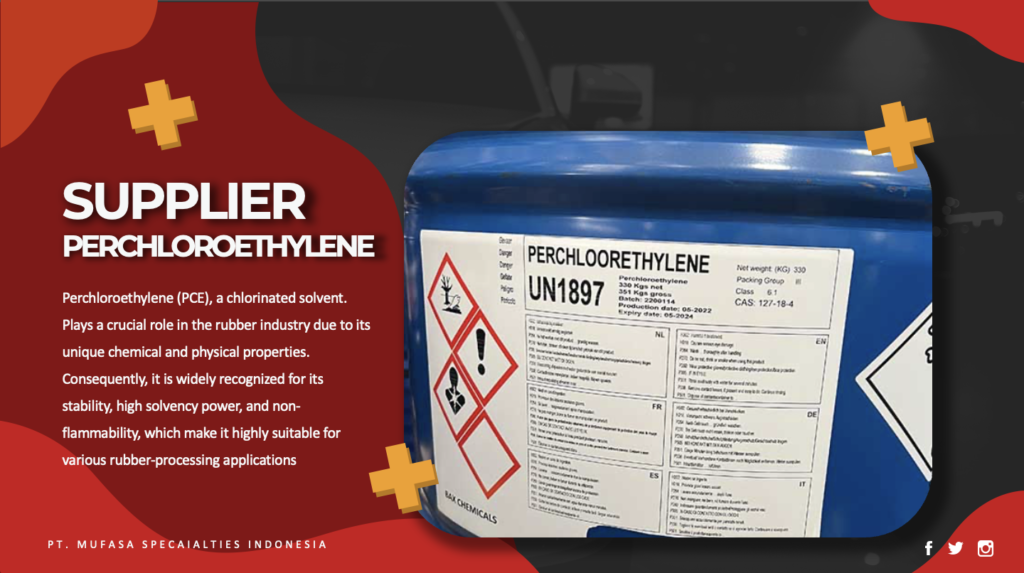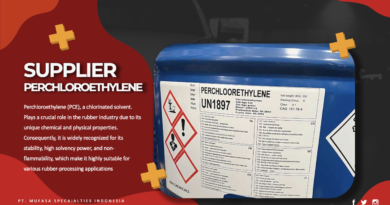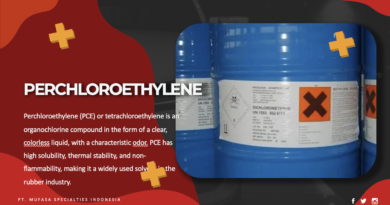
Supplier Perchloroethylene
Supplier Perchloroethylene (PCE), a chlorinated solvent. Plays a crucial role in the rubber industry due to its unique chemical and physical properties. Consequently, it is widely recognized for its stability, high solvency power, and non-flammability, which make it highly suitable for various rubber-processing applications. More specifically, PCE serves as an effective degreasing agent, cleaning solvent, and processing aid in manufacturing rubber-based products. Furthermore, its ability to dissolve a wide range of organic compounds makes it indispensable in multiple stages of production, from raw material preparation to final product finishing.
Supplier Perchloroethylene in the Rubber Industry
Supplier Perchloroethylene also called tetrachloroethylene. Is a volatile organic compound (VOC) with a chemical formula of C₂Cl₄. Additionally, it is a colorless liquid with a sweet, ether-like odor. In terms of its physical properties, PCE has a molecular weight of 165.83 g/mol, a boiling point of approximately 121.1°C, and a density of 1.622 g/cm³ at 25°C. Due to its high density and low viscosity, it effectively penetrates rubber compounds, making it a valuable solvent in the industry. As a result, these properties ensure that perchloroethylene can reach even the smallest crevices materials, allowing for thorough cleaning and consistent processing results.
Moreover, perchloroethylene is non-flammable and chemically stable under normal conditions, making it safer for use in industrial settings compared to hydrocarbon-based solvents. Its excellent solvency power enables it to break down organic residues, oils, and greases that may interfere with manufacturing. In addition, Perchloroethylene exhibits low surface tension, which enhances its wetting ability and makes it highly efficient in removing contaminants from rubber surfaces.
Applications in the Rubber Industry
Rubber Cleaning and Degreasing
Supplier Perchloroethylene One of the most significant uses in the industry is as a cleaning and degreasing agent. Given that various oils, waxes, and contaminants accumulate on the surface of rubber components during manufacturing, it is necessary to remove these impurities to ensure a clean surface before further processing. As a result, PCE dissolves these impurities, enhancing adhesion and improving the final product quality. Notably, the presence of residual oils or waxes can negatively impact the adhesion of rubber to other materials such as metals or textiles. Thus, PCE effectively removes these residues, improving the durability and performance of the components.
Consequently, manufacturers often use perchloroethylene in vapor degreasing systems where heated perchloroethylene vapors condense on rubber surfaces, dissolving unwanted residues. This process provides thorough cleaning without excessive mechanical agitation, thereby reducing the risk of damaging delicate rubber parts. Moreover, the efficiency of PCE in removing stubborn contaminants makes it particularly useful in high-precision rubber applications, such as seals, gaskets, and automotive components.
Solvent for Processing
Supplier Perchloroethylene is utilized in compounding and processing due to its excellent solvency properties. Specifically, it helps dissolve elastomers and additives, thereby facilitating uniform mixing and dispersion. As a result, this improves the homogeneity compounds, leading to better mechanical properties in the final product. More importantly, the even distribution of plasticizers, fillers, and curing agents ensures consistent performance, thereby enhancing the elasticity, strength, and durability of rubber products.
In addition to its role as a solvent, Perchloroethylene also helps regulate viscosity during rubber processing. Since maintaining the appropriate viscosity is critical in achieving uniform extrusion and molding results, PCE plays a key role in this aspect. More specifically, its ability to reduce the viscosity compounds enables better flow properties, preventing defects such as air pockets or uneven curing.
Mold Release Agent
Supplier Perchloroethylene In molding applications, acts as a mold release agent, thereby preventing products from sticking to molds. Consequently, this enhances productivity by reducing production downtime and improving the efficiency of the molding process. Additionally, its non-flammable nature ensures a safer working environment. Given that mold fouling is a common challenge in rubber manufacturing. Leading to increased maintenance costs and inconsistent product quality. The application of perchloroethylene as a mold release agent helps prevent rubber from adhering to mold surfaces. Ensuring smooth demolding and reducing defects such as surface imperfections.
Moreover, using perchloroethylene as a mold release agent extends the lifespan of molds by minimizing residue buildup. Consequently, this reduces the need for frequent mold cleaning, thereby lowering operational costs and improving overall production efficiency. As a result, manufacturers benefit from reduced material waste and higher throughput, making PCE an invaluable asset in molding operations.
Advantages of Perchloroethylene in Manufacturing
Supplier Perchloroethylene effectively dissolves organic compounds, thereby facilitating better processing and uniformity. As a result, its ability to break down contaminants ensures cleaner surfaces, leading to superior adhesion and overall product quality.
- Non-Flammability – Unlike many hydrocarbon solvents, perchloroethylene does not pose a fire hazard, making it safer in industrial settings. Consequently, this characteristic enhances workplace safety, reducing the risk of fires and explosions.
- Low Viscosity and High Density – These properties allow perchloroethylene to penetrate deeply into rubber matrices, thereby enhancing cleaning and processing efficiency. As a result, its ability to reach intricate rubber components ensures thorough contaminant removal.
- Stability – PCE does not react with most compounds, ensuring consistent performance over time. In addition, its chemical stability prevents unwanted side reactions that could compromise properties.
- Reusability – It can be distilled and reused, thereby reducing overall operational costs and solvent consumption. Consequently, the recyclability of PCE makes it a cost-effective choice for manufacturers.
Environmental and Safety Considerations
Supplier Perchloroethylene is highly effective in rubber processing, it presents environmental and health concerns. Consequently, it is classified as a hazardous air pollutant (HAP) and a potential human carcinogen. Given that prolonged exposure to PCE vapors can lead to neurological effects. Liver and kidney damage, and respiratory issues, industries utilizing perchloroethylene must implement stringent safety measures, including:
- Ventilation Systems – Proper exhaust ventilation minimizes worker exposure to PCE vapors. Consequently, industrial workplaces must install high-efficiency ventilation systems to capture and remove airborne PCE.
- Personal Protective Equipment (PPE) – Gloves, respirators, and protective clothing help mitigate direct contact and inhalation risks. Thus, workers handling Perchloroethylene must be adequately trained on safety protocols.
- Waste Management – Responsible disposal and recycling practices reduce environmental impact. Consequently, regulatory compliance with hazardous waste management guidelines is essential to prevent environmental contamination.
Future Trends and Alternatives
Supplier Perchloroethylene As environmental concerns grow, the rubber industry is actively researching alternative solvents that provide similar efficiency to perchloroethylene while minimizing health and ecological risks. Consequently, a few promising alternatives include:
- Aqueous Cleaning Solutions – Water-based cleaners combined with surfactants and emulsifiers offer effective degreasing without toxic emissions.
- Supercritical CO₂ Cleaning – Utilizing carbon dioxide under high pressure, this method eliminates the need for harmful solvents.
- Bio-Based Solvents – Renewable plant-derived solvents are emerging as sustainable alternatives for processing.
PT. Mufasa Specialties Indonesia is Reliable Supplier Perchloroethylene with High Quality Product and Good Price. We are Serving and Delivered Area such Jakarta Bandung Semarang Jogja Surabaya Medan and Batam
Supplier Perchloroethylene remains an essential solvent in the industry, contributing significantly to cleaning, processing, and molding applications. Consequently, its exceptional solvency power, non-flammability, and stability make it a preferred choice despite environmental and health concerns. With growing regulatory pressures, the industry continues to explore safer and sustainable alternatives. Thereby ensuring compliance while maintaining efficiency in manufacturing processes. More importantly, proper handling, safety measures, and waste management strategies are critical for minimizing risks associated with perchloroethylene usage in the rubber sector. Ultimately, the transition towards greener alternatives will shape the future of solvent usage in rubber manufacturing, thereby balancing efficiency with environmental responsibility.

